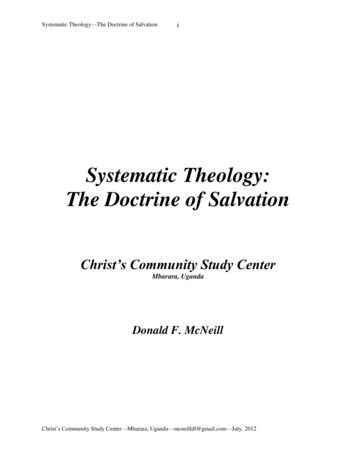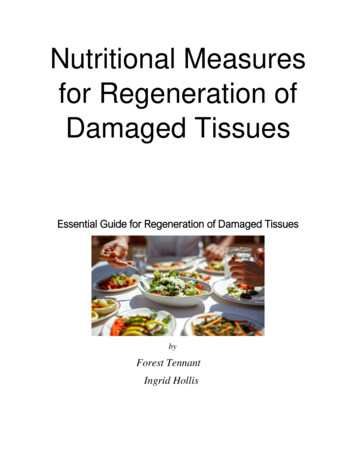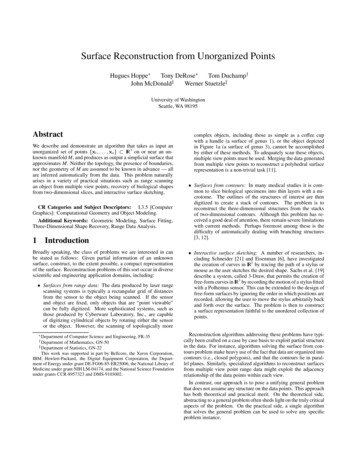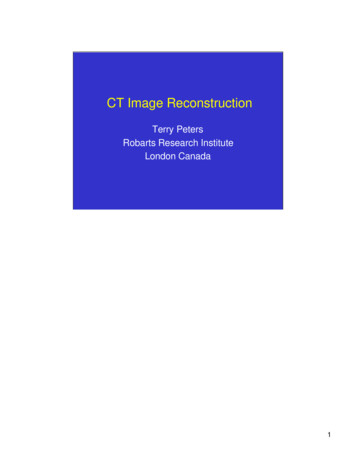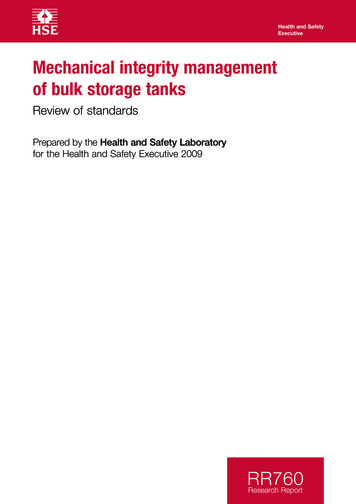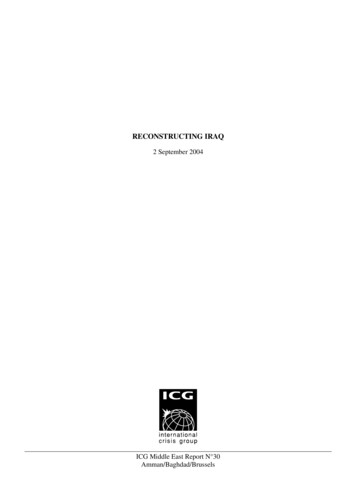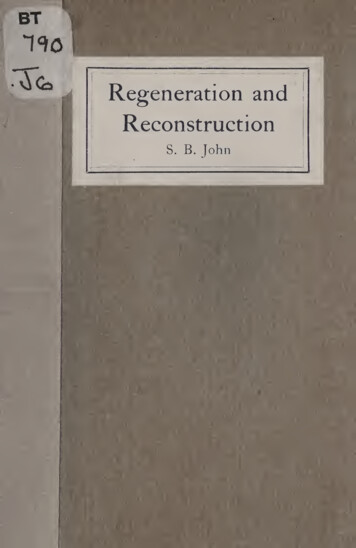
Transcription
Regeneration andReconstructionmm?:S. B. John'iiciht.a-isaai ISSf?Sg2Jir. :ffcti;r-7 1tp;;'?-
1BT7?QPKKSENTEI) BY/*
REGENERATION AND RECONSTRUCTION
REGENERATION ANDRECONSTRUCTIONBYS. B. JOHNWITH A FOREWORD BYTHE REV. JOHN CLIFFORD, C.H., M.A., D.D.YORKNEWGEORGE H. DORAN COMPANY1923'
.ft;J* 1923(-4// Rights Reserved)PRINTED IN GREAT BRITAIN BV HEADLEY BROTHERS,l8, DEVONSHIRE STREET, E.C.2 ; AND ASHFORD, KENT.
INTRODUCTIONThe bulk of what appears in the following pages waswritten in the winter of 1919-1920, and necessarilytook shape under the situation as the writer then sawit. Though much has happened since, nothing hastranspired to invalidate the argument or to deprivethe appeal of its urgency. The present situation onlyunderlines both. The author has not, therefore, madeany alteration to what he then wrote, save for a fewreferences to events which have taken place later. Heis well aware that there is nothing strikingly new inthese pages ; indeed, it is part of his plea that theremedy for the tragedy of our world is an old, old story,which is perfectly familiar to most of our countrymen.But the remedy has not been, and is not being, applied.He is profoundly convinced that the key to the situationlies in the hands of Christian people, to whom he makeshis appeal, and it is in the hope that this little bookmay awaken some response from the Christian Churchthat he ventures to send it forth. He rejoices in thecampaign of Personal Evangelism which has beeninaugurated, notably in the Free Churches, for it isin the regeneration of the individual that hope alonelies. But the call to the Church to face the situation
INTRODUCTIONand act is clamant, unless such action is taken ourcivilisation is doomed. There is no hope from anyother quarter. It is “ Christ or Chaos/* and, withoutany apology, he would address the Church in thelanguage of prophecy, “ Awake, awake, put on thystrength, 0 Zion, put on thy beautiful garments, 0Jerusalem.* *I would like to add my appreciation ofClifford’s kindly foreword.S.Fleckney,September, 1922B.Dr.John.
FOREWORDThe power of this book is primarily in its statement oftruth fundamental to the life of the individual, of thenation, and of the peoples of the world, but also in itsseasonableness.“ Allthings,"saysShakespeare,“ by season seasoned are to their just praise and dueperfection."Mr. John utters the truth for all time,but specially for the needs of our world civilisationat this hour.His emphasis is on the central andincomputable value of the human soul, on personality,but on personality pervaded and enriched by the spiritof God.Thus it forms a powerful and persuasive appealfor Personal Evangelism ; and so, by its insight, strongand clear style and numerous citations from the bestauthorities, will render a real and abundant service inthis day of our need.John Clifford.
CONTENTSCHAPTERIIIPAGETHE COLLAPSE OF CIVILISATION10THE DIVINE BASIS OF CIVILISATION25IIISPIRITUAL REGENERATION—ITS NECESSITY-38IVSPIRITUAL REGENERATION—ITS NATURE-51-63V SPIRITUAL REGENERATION—ITS FRUITSVIMETHODS71
CHAPTER ITHE COLLAPSE OF CIVILISATIONThe world has grown old, civilisation exhausted itself. Theworld is at the cross-roads. Facing a new epoch, the old worldpassing away in violence and collapse.1. The World Ruin Foreseen and Foretold.Sir Edward Grey, Lord Roseberry, Mr. Benjamin Kiddquoted. The socialist agitator.2. The World-ruin Described.Swift, complete and universal. Mr. A. G. Gardinerquoted. Effect on Monarchy and Democracy. Failure ofCommerce, Labour, Art, Science and Religion.3. The Cause of the World-ruin.Egoism.The Denial of God.The world a moral order.4. Factors of the World-ruin.(1) The reliance upon force. Diplomatic intrigue.Gilbert Murray quoted. The Westminster Gazette.Fisher’s plan.Prof.Lord(2) The false theory of the State. This a reflex of theselfishness of human nature. Mr. Harold Begbie on Egoism.(3) The Materialism of Capital and Labour.peace.The hardCynicism in politics.5. Historical Causes of the World-ruin.Darwinism. Aveling quoted. The struggle for existence.Haeckel, Neitzsche, Bernhardi, Treitzchke, Bernard Shaw,Eugenics. Competition justified.The results seen in the World-ruin.nature of things.Egoism at war with the
y Chapter ITHE COLLAPSE OF CIVILISATIONMommsen, speaking of the world which preceded theadvent of Christianity, declared that “ it was growingold, and not even Caesar could make it young again/'The same remark, with the alteration of a word, mightbe applied to the modern situation. Only elevenyears ago, Mr. Benjamin Kidd startled an Oxfordaudience by declaring to them that the world into whichthey had been born was dead. The world has grownold, the world we have known has exhausted itsvitality.We are standing " between two worlds,the one dead, the other ”—it doth not yet appear.We are witnessing the passing of an order of civilis ation, the world is at the cross-roads. We are on theverge of a new epoch, the character and value of whichno man knows, the only thing certain being that itwill be unlike the one which preceded it. It is thehope of all earnest-minded men that the new worldwill be worthier than the old, and, with that end inview, schemes, whose name is Legion, are being pro pounded. But before we can construct the new age,we must understand the cause or causes which led tothe collapse of the old ; we must discover the secretof the failure of that which has ended in smoke andflame. The war has been a great agony, but it h sxo
THE COLLAPSE OF CIVILISATIONiialso been a great revealer. In its lurid light, thefissures and cracks in the modem world have been madeplain. Our civilisation has been an artificial thing,it has lacked real coherence, and the war, with all itstragedy, has not been so much the cause of its passingas the occasion of its demise. It was already bank rupt before the war,, senile decay was written over allits works ; its collapse came because it was inevitable,if not by war, then by some other catastrophe just astragic. The war was but the consummation of itsown corruption ; it had waxed old, and was ready tovanish away.Careful observers before the war foresaw and fore told the ruin. Sir Edward, now Earl Grey, speakingof the expenditure upon armaments in the House ofCommons on March 29, 1909, said, " Surely the extentto which this expenditure has grown really becomes asatire and a reflection upon civilisation. Not in ourgeneration, perhaps, but if it goes on at the rate atwhich it has recently increased, sooner or later, I believe,it will submerge that civilisation." And Lord Roseberry, speaking a little later in the same year, usedwords of similar import, urging in a phrase now famous,that the countries were “ rattling into barbarism."“ I do begin," he said, “ to feel uneasy at the outcomeof it all, and wonder where it will stop, or if it is nearlygoing to bring back Europe into a state of barbarism,or whether it will cause a catastrophe in which theworking men of the world will say, ‘ We will have nomore of this madness, this foolery, which is grindingus to powder \" In the social and economic realmthis fear of impending collapse has been expressed by
12REGENERATION AND RECONSTRUCTIONmany. Mr. Benjamin Kidd, in his recent book, TheScience of Power, records the profound horror withwhich he listened to Galton's proposals for the breedingof a new race on the basis of Darwinian principles,and the conclusion he came to was " that this charac teristic science of force could never become the scienceof civilisation, but that as embodied in the West, alikein the military state and in the economic struggle,it was moving through world-shaking catastrophe toirretrievable bankruptcy in history.” The socialistagitator, in his desire for a new world, has gone further,he has boldly sought to compass the ruin of the ordernow passing. Yet when the collapse came, it waswith a swiftness which startled all observers, and witha completeness and universality which had not evenbeen imagined. The world was one in its sin ; it isto-day one in its ruin. In vivid language, Mr. A. G.Gardiner, the late Editor of The Daily News, describedthe present state of Europe in a special article in thatjournal, June 28, 1919. " Not since the Goths and theVandals broke up the empire that had been foundedby the Caesars has the Continent presented such aspectacle of universal wreckage as it does to-day. Theartificial structure of civilisation, painfully elaboratedthrough a thousand years of military strife and diplo matic cunning, has gone like a dream. Hardly a stoneof it is left standing. Thrones that seemed as enduringas the hills have fallen almost as unresistingly as leavesin autumn , empires that have existed for centuriesare broken up into fragments ; everywhere there isfamine, disruption, revolution, panic and an illimitablefear of the future. Humanity is like a city shaken by
THE COLLAPSE OF CIVILISATION13an enormous earthquake that has left it without ashelter and without a landmark of its former self.”The foreboding with which the future is faced is deep ened when one considers more closely the things whichhave gone down in the general wreck. Monarchy isno longer a word to conjure with, and the whole theoryof government is in the crucible ; democracy has notyet found its feet, the people are a mob, “ as sheephaving no shepherd.” The war has revealed, too, theinadequacy of the bonds which have been deemedsufficient for the binding of the race together. Cobden’sdream of a world-peace based on commerce has provenan illusion; the fierce tides of national feeing brokeat once all the connections of international trade,while the Internationale of Labour was impotent againstthe same forces. Equally impotent were the Artsand Sciences—spheres which have hitherto beenregarded as international in character, and Religion,the least sectional of all the interests of mankind, haspresented the strange spectacle of the members of thesame faith praying to the same God against oneanother. We have no illusions now as to the extentof the catastrophe ; it is the world that is in processof dissolution.To describe this ruin, however, is not to explain it;we must get deeper if we would search out the cause.We say “ cause ” rather than “ causes,” because wehold, fundamentally, the disease, and the ruin whichthe disease has wrought, have arisen, and can havearisen only, from one source, viz. the denial of love asthe basis of life, and the exaltation of egoism as life’scontrolling motive. Humanity swings between the
14REGENERATION AND RECONSTRUCTIONtwo poles of altruism and egoism ; the one is our light,the other is our darkness ; life comes from one, deathfrom the other. As we choose between them, so arewe determining our blessing or our doom. The worldis a moral order of which God is the Head. It reactsupon men as they respond to the opportunities whichlife presents, in blessing as they follow the high waysof mercy, faith and justice ; in cataclysm and doomas they follow the low ways of materialistic selfishness.The Psalmist’s declaration is profoundly true to history—“ The wicked shall be cast into hell and all the nationswhich forget God.” The hell of the present hour isbut the fruit of the God-denying selfishness which hasdominated the world so long. It must have come sooneror later, as inevitably as the abundance of harvestfollows the sowing of springtime. The moral orderknows no escape from the law of sowing and reaping.A closer analysis of the situation only confirms thisgeneral statement. The war, it is recognised, hascome directly out of the selfish ambitions of the leadingnations of Europe. It would be futile in this enquiryto single out any one nation as more guilty than anyother;* the disease is one which has bitten deeplyinto the life of all. The only arbiter recognised in thelast resort has been force, and each nation is in theposition of being accessory to the crime before it wascommitted. Ultimately each nation was bound bythe same theory, and in like circumstances would haveacted in the same way. Whenever the interests of* Dean Inge recently said “ Now it seems to most of us thatwe were all stark mad together” Christian World Pulpit, August3rd, 1922.The whole sermon is a noble plea for a Christiansolution of our war problems.
THE COLLAPSE OF CIVILISATION15one State conflicted with the interests of another,there was always the danger of war ; it was the morallydiseased atmosphere in which international relationswere carried on which made war practically certain.This atmosphere is described with extraordinaryfidelity by one well qualified to judge. ProfessorGilbert Murray, describing the condition of Europeaninternational politics in the eight years before the war,says that to him and those who think with him “ thereis something sordid and even odious about the ordinaryprocesses of foreign policy. There is a constant sus picion of intrigue, a constant assertion of interests,a dangerous familiarity with thoughts of force or fraud,and a habit of using silken phrases as a cover for verybrutal facts. Foreign politics are the relations betweenso many bands of outlaws/'He speaks of “ thecurious mental atmosphere in which our internationaldiplomats have to move. There is fear in the air,and it is fear that makes men lie/'1This judgment is confirmed by an article in theWestminster Gazette for October 31, 1911. Speakingof these same diplomats, the journal proceeded to say," We see them pulling wires, stealing marches on eachother, laying long and crafty plans which almost in variably miscarry, and missing obvious events whichthrow all their designs into confusion. And on oneside or the other there is a perpetual exploiting of theinherent loyalty and patriotism of their countries inquarrels which are mere combativeness for no purpose. ”z1 The Foreign Policy of Sir Edward Grey, by Prof. GilbertMurray, Oxford, Clarendon Press. Quoted by the Rev. Prof. D. S.Cairns, D.D., in The Reasonableness of the Christian Faith, p. 208.2 Quoted by Mr. Benjamin Kidd, The Science of Power, p. 16.
16REGENERATION AND RECONSTRUCTIONAccording to this authority, civilisation in Europeseemed to be returning to conditions of primitivesavagery.A still more startling confirmation of this point ofview has come to light in the publication of LordFisher’s astonishing book Memories, wherein thisdistinguished Admiral discloses the plan he advocatedin 1905 to “ Copenhagen ” the German fleet in KielHarbour after the manner of Nelson, without anyprevious declaration of war. It is admitted that thisplan became known to the Kaiser ; what does notappear to be admitted, however, is the appalling im pression such a plan must have had upon the inter national situation. The Machiavellianism of theproposal almost takes our breath away ; it can onlymerit the sternest censure of all men of goodwill. Theplea that it would have forestalled the “ inevitable ”war cannot be justified in the court of morality, whilefrom the point of view of its wisdom, it must be accusedof bankruptcy, as it probably had a great deal to dowith precipitating the conflict it sought to eliminateor localise. It reveals, moreover, the evil atmospherein which our international policies are discussed, andthe radically false theory which prevails as to therelation of one State to another. When one Stateis regarded as the potential enemy of another, it isnot difficult to see, provided the supposed " interests ”are deemed large enough and the movement suitable,that war must arise. It is the pernicious theory ofthe State as an entity in itself which poisons the wholeinternational atmosphere and creates a demand forwar when a clash of interests arises. The thunder
THE COLLAPSE OF CIVILISATION*7evoked in the British Press at the beginning of thewar against the Treitzchkean doctrine of “ the stateas power/' needs to be directed against all forms ofnational egoism. States are but “ unreal abstractions,"the temporary grouping together of certain individualswho inhabit a particular territory. National egoismcould have no existence apart from the egoism that iscommon to human nature, it is only the egoism of onegroup of individuals in opposition to another groupof individuals. All wars are undertaken for the sakeof gain or from the fear of loss, i.e., for selfish motives.Fundamentally, war arises out of the selfishness ofhuman nature and the conflict of the modern worldis but a reflex of the egoistic basis of modern life. Mr.Harold Begbie described this with great incisivenessin the year before the war. “ Look where you will,"he asserted, “ It is the spirit of I myself which is par amount. Life exists for Me. All the dim aeonsbehind have toiled to produce Me. This brief momentin the eternal duration of time is only the opportunityfor My pleasure and My ease. I care not a jot forthe ages ahead and the sons of men who shall inheritthe earth when I am dust beneath their feet. GiveMe My rights. Stand clear of My way. I want andI will have."1 The same writer returns to the chargein an article entitled “ The Egoism of Morality"which appeared in The Daily Chronicle, September12, 1919. He contends that our unrestrained individ ualism is “ consistent with the teaching of Neitzsche,and inconsistent with the teaching of Christ," andasserts “ that the great majority of Christians in1 The Weakest Link, p. 43.2
18REGENERATION AND RECONSTRUCTIONcivilised Europe are at this moment governed in theirconception of morals and politics by much the sameprinciple as that which Neitzsche laid down to theuniversal scandal of mankind. . . .We are stillegoists/’It is this fact which largely explains the chaoticconditions which prevail in the political and economicspheres of the modern period. Prior to the outbreakof war we were face to face with an organised attemptto overawe the authority of Parliament by the threatof force, it is notorious that the Home Rule questionbrought the people of these islands to the verge of civilwar. The ballot was to be defeated by the bullet;what could not be won or defended by constitutionalmeans was to be secured by extra-constitutional means.The deplorable tragedy of Ireland is the legacy of thisill-starred campaign. The idea of force has workedlike a poison in the minds of the people of Ireland,but the responsibility for all the unhappy episodes,culminating in murder, reprisal and now civil warbetween Irishmen themselves should be placed uponthose who first gave birth to the gospel of force asapplied to Irish affairs.In the industrial world the situation was no different,and its results have been similar. The discrepanciesbetween the " haves ” and the “ have-nots ” wereto be done away with by the “ class-war,” the wholeproblem was to be dealt with according to belligerentprinciples. In spite of many well-sounding phrases,the attitude of Capital and Labour to each other wasone of undisguised hostility. Mr. Herbert F. Stead,. Warden of the Browning Settlement, was quoted in
THE COLLAPSE OF CIVILISATION19The Daily News1 as saying “ their joy and hope hadbeen that the workers were exempt from the curseof materialism which had been the moral ruin of theupper and middle classes. But old Labour leadershad told him that the workers of to-day were too largelyinfluenced by the desire to get as much as they couldand to give as little as they could, and the tragedyof it was that they regarded that as happiness/’ Thelong succession of labour troubles since the armisticeprovides a grim commentary on the above statement,only one must add that the burden of responsibilitybelongs not to the workers alone. It is humannature which is at fault, and neither masters normen have a monopoly of its defects.The problem, atthe root, is personal, and economic formulae do notalter persons.Closely allied with this belligerent attitude towardone another of different portions of modern societyis the absence of moral idealism, and in many casesthe utmost contempt for it.No doubt to some extentthe peculiar complexion of the political world in GreatBritain is responsible for the moral paralysis of thelast few years, but this peculiar political conditionwas first a result before it became a cause. Compromisecould not have become such a fine art had not manyof our political leaders waxed cold in their devotionto principle. Even so, we were startled when theLord Chancellor openly flouted the Sermon on theMount; it was too reminiscent of M. Clemenceau’sjest at President Wilson for talking “ like JesusChrist ” to be pleasant; hitherto we have liked to1 September 2, 1919.
20REGENERATION AND RECONSTRUCTIONbelieve that we believe in ideals. Yet it is well thatour illusions should be dispelled. Quite a considerablenumber of our countrymen, we fear, adopt a franklyPagan outlook on life, and share the view that allidealism is nonsense. Quite recently a respectablejournal criticised the fairly moderate views of LordRobert Cecil as being “ too good for human nature’sdaily food,” “ the kind of confession of faith which weall reserve for Sundays and the hours of Service.” Weneed not wonder at the corruption of public and privatelife when the ethical basis of conduct is openly derided.Our failures at peace-making are directly due to theabsence of any spiritual valuation of human affairs.The Peace of Versailles, it was recognised, was a hardpeace ; what was not recognised was that it wouldinevitably produce a hard world. It is the war mindwhich has effectually paralysed all attempts at recon ciliation. The terms of Versailles were not peaceterms, but war terms, the dictation of the victors tothe vanquished. In spite of the warnings of history,peace was made in the spirit of war—with the sameeffect, the next war is already envisaged. Succeedingconferences have been vitiated by the same atmos phere, even that at Washington was rendered largelynugatory by the suspicion that the ships surrenderedwere sacrificed because in the next war they wouldbe already superseded. Disarmament remains adream, because the leading nations of Europe are notprepared to disarm their minds.We have tried to indicate, so far, things as they are,but it seems necessary to enquire how this prevailingegoism has come to exist. Selfishness is no new thing
THE COLLAPSE OF CIVILISATION21in human nature, yet it seems organised now in a wayit has not been since the days of the Roman Empire.It is the secularisation of life which marks off this agefrom the ages which preceded it, and which gives ita characteristically pagan tone. The standards ofvalue are made in the money-market. Mammon isthe God of our time. Our civilisation is frankly selfregarding in its motives.How are we to account for this ? No doubt manycauses have contributed to this frankly egoistic basis,but we feel that the present situation is largely theresult of the drift which set in with the acceptanceof the Darwinian hypothesis of the struggle for existenceas the main factor in evolution. By this theory egoismwas given a place in the scheme of nature which effect ually precluded all notions of sacrifice and service,and in the mouths of its professors a frankly utilitarianmorality was preached. Life was for the strong ; thewreak must be swept away. “ Every living being isan Ishmael. Its hand is against all others. Thehands of all others are against it. . . . Vae Victis,woe to the conquered, is the cry of the world/’1 Notthat Darwin himself necessarily made these applicationsas later Darwinians have done ; indeed there is evidenceso far as Darwin himself is concerned, to the contrary.But in the hands of later Darwinians, the hypothesishas become determinative of their world-view, andeverything has to bow down to it. Thus Haeckelabolishes the dualism between egoism and altruism,and asserts their " equivalence.”2 All morality he1 The Students’ Darwin, by the late Dr. Edward Aveling.2 The Riddle of the Universe, p. 124.
22REGENERATION AND RECONSTRUCTIONeduces out of “iron laws.” Nietzsche carried thematter further in proclaiming a ruthless individualism.He rejects Christ as " decadent,” and preaches a“ master-morality ” instead of the gentleness of Christ ianity which he terms “ slave-morality.” The fullconsequence of this ruthlessness is seen in Bernhardi sdoctrine of “ the biological necessity of war,andTreitzchke’s deification of “ the State as power,” whichworked out in practice to the militarisation of modernGermany. But the Nietzscheans are not all on theContinent; in this country a view of life is held whichis not essentially different. Mr. Bernard Shaw haspreached “ the Super-man ” which is to be attainedby the aid of Eugenics—the bearing of which may beappreciated from the place given to competition as thesole arbiter of fitness. According to this new science,the conception of altruism as an evolutionary force incivilisation is “ biologically false,” the only instinctwhich is sufficiently universal to supply the motivefor exertion in civilisation is the desire to accumulateproperty in the competitive struggle.1 It is this franklyself-regarding point of view which has gradually per meated all ranks of Society, and which to-day dominatesall our relations, international, national, industrial andsocial. Douglas Jerrold had reason for his bitingsaying “ We are all brothers. Yes, Cains and Abels.”Antagonism, not altruism, is the basis of our civilisation.Competition is the weary road by which humanity haschosen to march to its destiny.Now, it is not difficult to see that the end of such1 See William Bateson's Biological Fact and the Structure ofSociety, quoted by Benjamin Kidd, The Science of Power, p. 85.1
THE COLLAPSE OF CIVILISATION23a lorry scheme of things must be collapse. It is theold atomic theory coming into the realm of humanlife and conduct, the law of the jungle and not the lawof the home. Each individual becomes a beast ofprey, and his personal advantage depends upon hissuperior strength or cunning. It is true that thesepreying instincts become modified by adherence to aparticular group, it may be the family, the Church orsome other Society, and within these groups a fair levelof communal life may be realised for a time, but theegoism of the individual becomes massed into a groupegoism, and thereby intensified (as in the case of warbetween different States). In the desert of humanlife, man constructs an oasis for himself and his friends,but he accentuates the desert by acts of plunder againstthose who are not of his group. The law of the desertstill obtains to the disintegration finally of each group.Living for itself, the group ultimately dies ; groupselfishness contains the seeds of its own death. It isat war with the nature of things, and the nature ofthings reacts upon it to its own destruction.In this analysis of modern civilisation, we have anexplanation of the chaos of the modern world. Manhas flung himself away from the true centre of his life,he has organised his existence in defiance of the Divineorder. In effect, he has challenged the Almighty tomortal combat. And the issue reveals the deplorablefailure he has wrought. “ Be not deceived, God isnot mocked, for whatsoever a man soweth that shallhe also reap/'
CHAPTER IITHE DIVINE BASIS OF CIVILISATIONAltruism or Love the ideal.1. The Ideal Universal.Buddha, Confucius, Socrates, Hillel, The Stoics.2. The Ideal Fulfilled in Christianity.God as the source of love. The Fatherhood of God and theBrotherhood of man. The failure of earlier systems due tolack of sufficient motive. Christ realises ideal through theRevelation of God and His own sacrifice.3. The Ideal Justified.(1) By Science.world a spiritualThe mechanical theory routed. Theworld. Factors in Evolution Ethical.Thomson and Geddes.Kropotkin, etc.(2) In Literature. Negatively, by Shakespeare. Posi tively, by Dante, Browning, Tennyson, Francis Thompson.(3) In Philosophy. Modern concept of personality involveslove. Illingworth quoted.(4) In History. The Christian Home.Family affection.Appeal to love as the greatest thing in the world.
ChapterIITHE DIVINE BASIS OF CIVILISATIONWe have seen so far that the bane of our so-calledcivilisation is egoism, the erection by man of the selfregarding instincts as the first law of life. Confrontingthis, however, is the opposite ideal of altruism, whichhas never been wholly absent from our world, thoughunhappily never yet dominant in it. In all ages lovehas been honoured as the true foundation of humanlife, and poets and philosophers have sought to giveit expression in their teaching. Thus Buddha taughta doctrine of charity which in many respects anticipatesthe Christian doctrine. “ Liberality, courtesy, kind liness and unselfishness," he said, “ these are to theworld what the linchpin is to the rolling chariot "—theykeep the world in its course, as the linchpin does thechariot wheel, and prevents its inhabitants from beinghurled headlong to destruction. Many of the sayingshanded down from Confucius seem instinct with moremodern ideas, and in his characteristic work “ Recip rocity/' he comes near to Christianity. Socratesis credited with a negative form of the Golden Rule,while Hillel, the Jewish Rabbi, said, “ What is hatefulto thyself, do not to thy neighbour. This is the wholelaw, the rest is commentary." The Stoic morality25
26REGENERATION AND RECONSTRUCTIONconceived a state where “ there shall be one life andone world, as one flock led by a common law.”1 MarcusAurelius thought of each man as a citizen of the world,and that “ we are made for co-operation, like the feet,the hands, the eyelids, the upper and the lower rowsof teeth,” “ for, what is not good for the swarm is notgood for the bee ”—a doctrine which involves altruismof the highest kind. We see in these ideas a reachingforth toward the conception of Love as the basis ofhuman society. But in Christianity, this conceptionis crowned and glorified ; it is the raison d
told the ruin. Sir Edward, now Earl Grey, speaking of the expenditure upon armaments in the House of Commons on March 29, 1909, said, " Surely the extent to which this expenditure has grown really becomes a satire and a reflection upon civilisation. Not in
